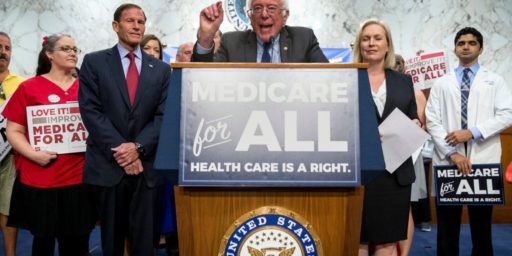Investment Insurance?
This is from James’ post about Bush’s New Deal (link). He points to an article in the WSJ that has this part near the top.
Another proposal would be the creation of federal insurance for investors in money-market mutual funds, coverage akin to the insurance that currently safeguards bank deposits. The move is designed to stem an outflow of funds as consumers start to worry about even the safest of investments, a sign of how the crisis is spreading to Main Street. There is $3.4 trillion in money-market funds outstanding.
Great, so now we’ll have an even larger problem with moral hazard. People will now be inclined to take greater risks than they otherwise would since there is insurance to cover their losses or at least part of their losses. This is a bad idea. We already have rotten incentives by basing bonuses on Wall Street on annual performance vs. say performance over a 5 year period. We don’t need more risk taking, but less. This is like finding out you have a hole in the bottom of your boat and your solution is to make it even bigger. I guess one way to look at is that once your boat has sunk it can’t sink again, but frankly I find that solution of little comfort.
There was also this suggested policy as well.
At the center of the potential plan is a mechanism that would take bad assets off the balance sheets of financial companies, said people familiar with the matter, a device that echoes similar moves taken in past financial crises. The size of the entity could reach hundreds of billions of dollars, one person said.
For all their supposed brilliance (and I do think Bernanke is indeed very, very smart), these people have apparently learned nothing in their lives from any previous financial crisis. Nothing. As the article notes we did this before and yet here we are yet again with another financial crisis. By continualling bailing these entities out we reduce the downside to risky investments. We have here a great big fat time inconsistency problem. This is why discretionary policy is always failing in the long run. Reasonable and forward looking agents realize that the government will step in to cover loses if things get too bad. So people engage in activities that sooner or later result in things getting too bad and necessitating the intervention of the government.
These policies are likely to lay the seeds for our next crisis. Not directly, but by fostering irresponsible behavior and dependency on government bailouts.






Since Dr. Bernanke’s specific field of study is the Great Depression of the 1930’s and the government’s responses to it, it’s hard to believe that’s the case. My guess is that his and other experts’ priorities are different from yours or mine.
Interesting and again, I agree with the principles in question. ‘insurnace’ is not a magical wand, and certainly will induce unwanted and perhaps unintended consequences. Such a response is to be avoided.
However;
….I tend to disagree that this current situation can be blamed on managers engaging willingly in risky investments. Perhaps we’d do well to discuss your take on what those risky investments were/are. To what degree do they include questionable lending practices… lending to people who have no credit to speak of, for example?
The federal government is supposed to be taking care of its citizens, not banks. It has passed legislation that has allowed banks to rape its citizens and is now on the verge of taking more of the citizens’ wealth to give to the ones who have raped them.
The disaster that has been created by the government does call for unprecedented action, but the taxpayers should not be the only ones to suffer. Instead of spending taxpayer money on bailing out the banks, they should be spending taxpayer money to bail out taxpayers and the banks will benefit as a result. They should:
– eliminate all variable rate mortgages and replace them with fixed rate mortgages at reasonable rates of no more than 6%.
– Recalculate the amount that home owners are in default at the new rate.
– Pay that amount to the banks who wish to participate on behalf of the taxpayers.
– Allow taxpayers who have been foreclosed on and who can afford the payments at the new rates to move back into their homes.
– The banks that do not wish to participate do not get paid.
– Forbid credit card interest at loan shark rates and forbid credit card companies from raising interest rates once cardholders have used their cards.
– Force banks to recalculate credit card debts at no more than 12%.
– Roll back legislation that was passed three years ago to allow this to happen.
– The banks that cannot live with the amount of money that they will be recovering, should just be allowed to go under.
– Arrest, imprison, and fine those who spread the rumors, which led to the collapse of financial institutions.
Wrong Business
Government by fiat! How could we all have been so dense to have not seen this as the ultimate solution? Freedom, bah, humbug. Overrated.
But all that pales in comparison to:
So much for ever getting any financial advice again, now that being wrong can be considered a thoughtcrime. I feel like Peter Parker in the last Spiderman movie, “Where do they come up with these guys?”
Web,
That is the worst list of policies I have ever seen. You want to take the moral hazard problem and let it run rampant with consumers now too. Great.[/sarcasm]
Dave,
That much is clear, problem is they aren’t going to solve the problem in the long term. They are going to solve a problem that probably wont repeat itself, but at the same time help ensure that we’ll have another crisis again.
Bithead,
I don’t think the idea can be chalked up only to being forced into bad lending practices. Too many of these firms were happy to jump on the gravey train when it was going full steam.
In the long run we’re all dead. At least that’s what I suspect they’re thinking.
No with increased life spans these days, we just go into retirement and then have to go work at McDonalds to pay for these fine fellows ideas.
Of course!
But who forced them them down that path, Steve?
Keep in mind that even before this type of interventionism, people didn’t seem to learn from the bubbles that happened before – witness the South Sea Bubble and Tulip Craze.
Good point. You can argue the government opened the door, but a lot of folks happily rushed through it with $$$ dancing in their heads.
I sat down with a mortgage broker at the height of the real estate boom and for every concern I raised about adjustables, I heard a whole lot of “don’t worry about that”.
He just blew a bunch of smoke up my butt, and obviously did not care about us beyond making a deal and getting a check. No one from the government was pointing a gun at his head. Times that by a few million and you have a real problem.
I well remember brokers at the local bar laughing about the deals they were making that they KNEW were going to fail and bragging about making 20k a month. Due diligence? Not for these guys. Imagine the guys higher up the food chain making that times 100…
The government contributed to the problem. It is not THE problem…
Yes, we all know that you’re desperate to blame all of this on the government, specifically the Democrats. You’ve made it painfully clear that is your agenda.
But in your haste you’re overlooking the fact that his isn’t just about mortgages anymore. They were the straw that broke the camel, but that camel was already loaded with all kinds of dead weight just waiting to drop, and most of that was not put there by bureaucrats.
I’m not trying to blame this just on the Democrats. If we can get rid of the Republicans and Democrats great. At the very least, can we get a moratorium on earmarks and new government spending for a little while?
I wasn’t saying you were, I was accusing Bithead of that.
I doubt it. Democracy inherently encourages people to choose expedient actions, not correct ones. The only thing that’s saved us from worse than this in the past is the fact that we are almost always divided on what we want.
What you seem to keep neglecting is that nobody was given much choice. When the government says investment in loans to people with no credit is a valid thing to do, and requires banks to do this, why, everyone else falls into line or else.
Well, gee… guess what?
I am… and the facts back me up, there.
Incorrect. You seem to forget, I spent ten years at a national bank. I know.
You either produced numbers that made the bank look good on the “I’m not racist” spreadsheet or you found another job. You fail to understand just how foundationally the MO of lending institutions got changed by the government’s tampering. What you describe was all part of that.
That all rests on government, and particularly on the Democrats.
You are right. All those brokers that were making 250k a year were dragged kicking and screaming into writing those loans, totally against their will. Jackbooted Democratic thugs where everywhere, intimidating these poor souls. Greed had nothing to do with it. Nothing, I say…
Why, yes, they were.
Why do you suppose a law was needed to accomplish the goal of getting them to write such loans, hmmm?
Bit, don’t talk like a chump. After all, you are the guy who supposedly Knows.
Once the door was open, these cats sprinted thru it in pursuit of a fast buck. A business opportunity was created, and they took advantage of it, with no regard for the consequences, as long as they were making major scratch.
I think you’re both exaggerating, just a little.
The government didn’t force anybody to give out bad loans, they just set rules to try and promote home ownership among minorities, a noble cause if nothing else. The problem that they should have foreseen was that the easiest way for lenders to comply with those rules was to give loans to people who shouldn’t have gotten them. As Bithead said, the higher-ups usually care more that everything is followed on paper than in practice, so claiming that there weren’t enough qualified minorities wasn’t going to cut it.
On the other hand, it’s not like lenders naturally wanted to take advantage of these people for their own profit, after all there was nothing stopping them from doing that 10 years ago. The problem here is that once a large enough portion of your competitors starts making money hand over fist writing and selling sub-prime loans, you have to start doing it too, just to compete. It’s like the doping argument: if it’s allowed, even athletes who don’t want to dope will be forced into it in order to stay in the game.
Ah, another day, yet another problem/scandal/crisis/societal collapse/world destruction thing Democrats are responsible for.
Bit, tell ya what: We’ll just assume you blame liberals for everything, and then maybe you can just post when liberals *aren’t* responsible for something. That way, you’d save a lot of wasted breath.
Seriously, think of the things you could do instead of furiously blaming liberals for everything. You could go out and have a beer, kiss a girl, move out of your parent’s basement. O the possibilities!!
Nobody forced them, so your premise is wrong, IMO. Too many were way to keen on these creative home loans, and CDOs and all these other instruments. Throw in Uncle Sugar always riding in and bailing them out, and the psuedo-regulation that lets smaller investors/consumers ignore trying to evaluate risk since the government will cover them and is regulating things.
Of course! But, also, of course they were forced into such loans. think, now;
Once the government puts their stamp of approval on an MO, who are mere bankers to question it, particularly when the rest of the herd is on the ‘I’m not racist’ train? And how to explain to investors how it is yo’re so far behind in the area of home loans when everyone else’s values are skyrocketing, without sounding racist?
After all, being seen as an ‘equal opportunity lender’ is all he rage with the investors, just then, eh?
You speak of force? Trust me, bank officers who dind’t make loans that matched the new criteria, didn’t have a job next morning. Force enough, I suppose.
Yes, they were forced into making bad loans. Not, as you insinuate, by the government, but by the market. Once everyone else was writing bad loans, you either did the same or you watched your market share shrivel up and disappear. If you can’t beat them, join them, was the rationalization. This has nothing to do with racism, or the appearance of racism, or the evils of equal opportunity.
It took more than government pushing for minority home ownership to make these people write bad loans, they had to have a way to absolve themselves of the responsibility. Ironically, the government came through for them on this too, allowing them to trade their responsibility on a market closed from regulation, closed from monitoring, and closed from auditing. People thought that they were diluting their risk, when in reality they were just trading their risky investment for someone else’s risky investment, only they didn’t know how risky the other guy’s investments were, because there was no oversight.
So everyone thought they were gaming the system, you win if you are trading out more risk than you are trading in. This led to an incentive to obtain ever more, ever riskier debt in order to keep feeding the system.
So, you’re suggesting that the market shouldn’t have followed the government’s lead, here? Once again, we hear Otter saying: “Flounder, take it easy, man… You F’d up… you TRUSTED us…”
This is what happens, Mcheal, when people try to toy with the free market, who really have no clue about how it works.
The government didn’t take the lead, it just left the door open. The government was negligent, it let people do things they shouldn’t have, but it didn’t make them do it.
Yes, but again you have it backwards. You, taking the side of the market, are blaming the government for trusting the market to act diligently instead of opportunistically.
Now you’re claiming that the CEOs of investment banks had no clue about how it works?